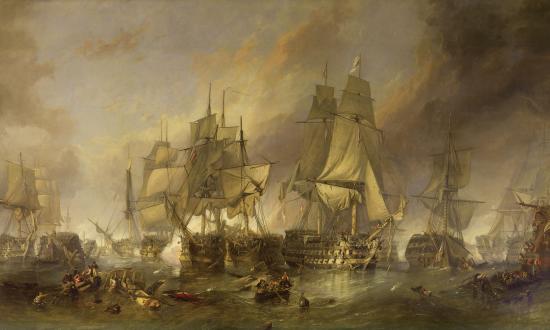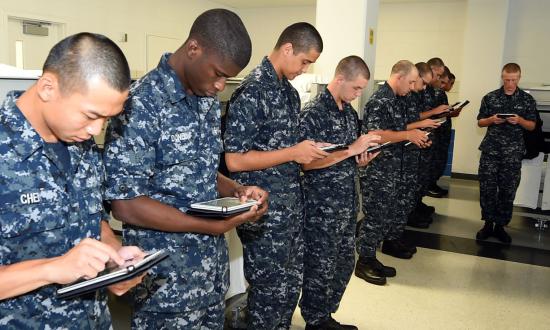Surprisingly little reading material—beyond the Division Officer’s Guide (Naval Institute Press, 2017)—has been dedicated to helping Navy lieutenants and lieutenant commanders solidify their leadership styles and achieve success as department heads. As I recently worked my way through the executive officer (XO) training pipeline, I had time to reflect on the path I took to get where I am today. Frankly, I could have done it better. I hope by sharing some missteps and lessons I learned about communication, attitude, and teamwork, that future department heads will be able to do the job more effectively than I did.
Communicate Concisely, Convey Context
Being able to concisely communicate direction, good ideas, and information up and down the chain of command is an undertaught skill. Successful department heads must focus on improving the effectiveness of their communication by tightening their delivery and stripping the emotion. Navy parlance calls this the bottom-line up front (BLUF), which is designed to provide crucial information at the beginning of a report. “Captain, there was a minor electrical fire in Main 2, no injuries, the fire is out.” “Captain, we have several pop-up contacts, the ship is not in danger but request you come to the bridge.” Eliminating dramatic buildup in a report will help keep your boss calm and ensure the important part of your message gets through. Concise communications show you understand the situation and have it under control.
Different situations, however, require more nuanced methods of communication. If you are particularly blunt and outspoken, distilling a complex situation to one or two sentences can be precarious. One of the handful of times I was sure I was going to be fired as a department head involved a conversation with my captain about a performance problem with one of the ship’s division officers.
Having recently reported, I feared that if I documented the officer’s performance issues, the commanding officer (CO) would not have my back. My CO was, understandably, defensive. He expressed that he would always consider the facts of a situation before deciding who he would “back.” My brash and tactless manner of explaining the situation nearly cost me my job. A better approach would have been to ask the CO what he would do in a hypothetical situation similar to my own. Seeking advice and counsel, rather than going on offense, is a much more effective means of working through disciplinary issues.
Leaders at all levels need context to inform their decisions. Providing your leaders with context is just as important as training your team to give you the full story. If you use them as a sounding boards, junior sailors will astound you with their ingenuity and ideas. Retired Vice Admiral Dixon Smith, as Commander, Navy Installations Command, captured this at one gathering by silencing a room of installation leaders so they could listen to a comment from a junior staffer in a distant corner, telling the group, “Usually, the farther you sit from the front table, the more important you are to getting the real work done.” This certainly is true on Navy ships, where the sailors who keep the ship combat ready are seldom sitting in on the decision meetings.
When practical, take the time to solicit buy-in from your team and be willing to give ideas run time if they do not risk injury or damage. The goodwill you earn by being positive and taking a leap of faith for your team will become apparent through increased brainstorming and ideas—traits desperately needed in today’s Navy.
Seek Advice, Stress Success
Just as effective communication is critical to a successful department head tour, so, too, is the ability to self-reflect and shape a positive attitude. Department head tours are tough, and despite six to ten months of training, you probably will not feel ready for the job. Once you are immersed, your job satisfaction will improve if you consciously shift your focus from “How do I not fail?” to “How do I succeed?” Our unique role as military leaders demands we focus on combat readiness, and persistent worry about failure will deter you from reaching your warfighting capacity. As a midgrade leader and decision-maker, you must strive to think like a CO, but also have the wherewithal to know you do not have as much information or experience.
Control your pride and emotions and, when the time is right, seek clarification when a decision does not go your way. Likewise, you will accelerate your development by candidly and brutally evaluating your blind spots and areas of weakness and striving to improve on them. At the same time, make sure you fully understand and play to your strengths. A mentor, Commander Riley Murdock, once advised me that “success begins with knowing what you do know and what you don’t know. Respect is earned when people realize you are honest about this.” To achieve success as a team, the most crucial group with whom to have this frank and honest relationship is your fellow department heads.
Think Team, Trust Teammates
Good department heads focus on teamwork. Your fellow department heads are your shipboard family, and you will largely sink or swim together. As mentioned, the most successful ships have department heads who strive to think like COs. That means the department heads must act as a team by trying to consider the needs of the other departments when advocating for their own departmental needs.
As weapons and combat systems officer, I struggled to squash my attitude of “That’s why we have an XO,” to broker issues across departments. Now, as a sitting XO, I understand how much more helpful it is to have department heads working together to deconflict and consolidate plans rather than leaning on the XO to do it. Some of the most challenging moments with your peers will come during sailor and junior officer ranking boards. My good friend Commander Dominique Jackson always seemed to be the most prepared to explain the contributions his sailors were making. I failed miserably at keeping my emotions out of the boards while trying to do right by my sailors. Trust that board outcomes are just a data point for your CO, and do not be so stubborn as to jeopardize your professional relationships—not to mention potential lifelong friendships—with your fellow department heads.
History tells us that, one day, the nation again will call the Navy into the fight. We owe it to the nation to be ready. While the Navy is more lethal today than ever before, it must take every opportunity to build on the current confidence, capability, and strength of this generation of warfighters. Effective department heads are a linchpin to warfighting success and for growing future COs and XOs. I did not always choose the path of least resistance, nor did I always reflect, self-assess, and strive to improve as much as I wish I had. As future department heads, if you focus on effective communication, maintain an infectious, success-oriented positive attitude, and commit to full teamwork with your fellow department heads, you can maximize your effectiveness and help build a Navy even more prepared to win the future fight.







